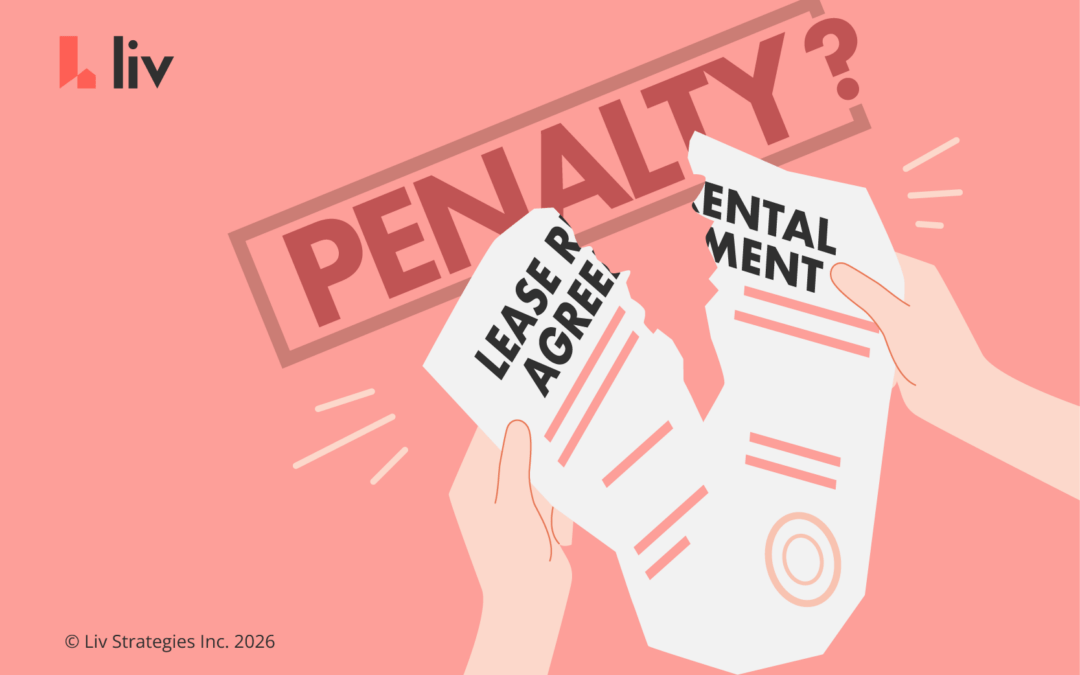Being a landlord can be a lucrative and rewarding venture, but isn’t without its fair share of risks. Rental scams are a growing issue in major cities across Canada, and tenant scams are unfortunately becoming increasingly commonplace. While the vast majority of tenants are honest, reliable individuals, there are some who may try to take advantage of landlords in an attempt to secure free rent, cause damage, or otherwise negatively impact their property investment. This post from liv.rent will break down five of the most common tenant scams targeting landlords, plus tips for how to utilize tenant screening to recognize & steer clear of these unscrupulous renters and protect your rental property.
Find the right renters faster with the Trust Score
Unlock an easier, more effective way to screen renters. The Trust Score from liv.rent combines credit information from Equifax®️, income & employment verification, court records, and more into one easy-to-understand score. Click here to view an example of the Trust Score.
What are tenant scams?
Rental scams have been all over the news lately after seeing a substantial increase in both frequency and severity in recent years. More often than not though, these reports concentrate on dishonest landlords aiming to defraud tenants with fake listings, deposit fraud, and other shady techniques.
Less talked about are tenant scams, which are a type of fraud where renters seek to obtain free rent, cause damage, or otherwise take money from landlords through a variety of means. Often, these tenants can appear as qualified candidates on paper, which makes it hard to spot red flags without educating yourself on common warning signs of tenant scams or using a platform that manually verifies renters’ profiles.
Next, we’ll break down some of the most common types of tenant scams targeting landlords, plus tips for how you can protect yourself from each.
The most common types of tenant scams
Here are some of the most frequently observed scams targeting landlords in Canada. It’s important to understand that scams are complex and constantly developing as awareness grows, with new types of scams emerging seemingly all the time. Landlords should always keep an eye out for reports of tenant scams in their area before listing their units to get a sense of what scams are currently going around your area.
1. Payment scams
Payment scams are likely the most common form of tenant fraud that landlords will encounter. With so much money exchanged during the rental process, opport
unistic scammers can take advantage of landlords’ lack of awareness to either avoid paying rent, or even get the landlord to pay them money that isn’t theirs in some cases.
There are a number of different payment scams that landlords should familiarize themselves. Here are some of the most common:
- Overpayment: The tenant pays more than the agreed-upon rent and asks for a refund, typically with a fake check or money order, which later bounces.
- Deposit Fraud: The tenant provides a fake or insufficient security deposit to secure the rental property, leaving the landlord without proper protection.
- Bounced Checks: Tenants may pay with a cheque that doesn’t clear, leading to financial losses and inconvenience for the landlord. Often, these cheques are post-dated so landlords may not realize until it’s too late.
How to avoid:
To avoid payment scams, consider using traceable online payment methods, such as direct bank transfers or electronic rent payments, to minimize the risk of bounced checks. Keep a clear record of all payments sent & received, and be sure not to cash any cheques that are for the wrong amount.
Thorough tenant screening can also help avoid payment scams altogether. It’s always a good idea to look at tenants’ financial history through a credit check, but a comprehensive report of applicants’ suitability is your best bet at avoiding payment fraud.
>> Recommended Reading: 5 Reasons Landlords Should Leverage the Trust Score
2. Property damage
Some tenants intentionally cause damage to the property they’re renting, such as large holes in walls, broken fixtures, or excessive wear & tear, and may attempt to conceal it as normal usage. These unscrupulous tenants can leave landlords with significant repair expenses, decreased property value, and legal challenges when it comes to claiming damages from their security deposits.
How to avoid:
To protect against property damage, conduct a thorough move-in inspection with a detailed checklist and photographs, noting the condition of the property before the tenant moves in. Encourage open communication with tenants, addressing maintenance issues promptly to prevent minor problems from escalating into significant damages. If allowed in your province, be sure to collect a damage deposit as this can help cover any repairs that might be necessary.
Download your free rental inspection checklist
Thorough inspection of your rental property is needed to avoid disputes over potential damages. Use this free walkthrough checklist during move-in and move-out to assess your unit’s condition.
3. Fake information
Some tenants provide misleading or false information during the rental application process, such as fake references, inflated income figures, or concealing previous eviction history. By doing so, they aim to appear more desirable to landlords and secure a rental they would not otherwise qualify for, potentially leading to unpaid rent and other problems throughout the tenancy.
How to avoid:
To prevent falling victim to false information scams, make sure you are thorough in your tenant screening, looking at applicants’ rental history, credit history, records of legal infractions, and contacting landlord and/or employer references provided by the tenant. Establish clear criteria of the type of tenant you’re looking for, and ask plenty of questions throughout the application process.
As a final layer of defence, use a rental platform that verifies renters’ income and employment to ensure applicants meet the necessary qualifications.
>> Recommended Reading: 56 Questions Every Landlord Should Ask Applicants Before They Sign A Lease
4. Unauthorized subletting
It’s not uncommon for unscrupulous tenants to sublet the rental property without obtaining the landlord’s approval, which poses potential legal and safety risks for landlords. Landlords may lose control over who occupies the property, leading to disputes and complications in managing the tenancy.
How to avoid:
Mitigate unauthorized subletting risks by including specific lease addendums that prohibit subletting without written consent from the landlord. Regularly communicate with tenants to stay informed about any changes in their living situation and encourage them to seek approval before subletting.
>> Recommended Reading: Understanding Lease Addendums Part 1: What Is A Lease Addendum?
5. Professional tenants
Professional tenants are individuals who exploit landlord-tenant laws and eviction processes to live rent-free, often by filing frivolous complaints, refusing to pay rent, or exploiting legal loopholes. These deceptive individuals may prolong eviction proceedings and cause financial hardships for landlords. This type of scam became increasingly common in more recent times due to delays in the dispute resolution process in many provinces.
How to avoid:
Landlords can protect themselves from professional tenants by implementing a rigorous tenant screening process, taking advantage of comprehensive reports like the Trust Score to gain a complete picture of each applicant’s suitability and trustworthiness. Familiarize yourself with tenant rights and eviction laws in your region to act in accordance with the law while also safeguarding your interests as a landlord. Be sure to maintain thorough documentation of all interactions with tenants to defend against baseless claims or allegations.
How to protect yourself from tenant scams
Tenant scams pose significant challenges and financial risks for landlords, but there are proactive steps that can be taken to avoid falling victim to fraudulent activity. Staying informed about landlord & tenant rights and local rental laws, while documenting all interactions with tenants, also serves as a crucial defence against potential scams. By prioritizing due diligence and vigilance, landlords can create a safe and secure rental environment while minimizing their exposure to tenant scams.
By far the most effective way to avoid tenant scams altogether is by implementing a thorough tenant screening process that goes beyond credit checks to consider every aspect of an applicant’s suitability. Landlords can automate this process by taking advantage of the Trust Score from liv.rent – powered by information from Equifax® credit reports. Combining financial information, a detailed risk assessment, manual income, identity & employment verification, and more into a single, easy-to-understand score, this tool helps you rent with confidence knowing that you’ve done your due diligence in understanding exactly who you’re renting to.
By combining detailed background checks with knowledge of rental laws and clear & open lines of communication, landlords can significantly reduce the likelihood of encountering payment scams, property damage, false information, unauthorized subletting, professional tenants, and any other scams that may be commonplace in your area.
>> Recommended Reading: How To Screen Tenants And The Best Tenant Screening Tools To Use
FAQ: Types of tenant scams in Canada
How do I tell if my tenant is legit?
Fake tenants are less common than fake landlords & listings, but are still a significant risk to be aware of. Be sure to do your due diligence when deciding who to rent to. This means performing credit checks, calling references, and verifying applicants’ identity by checking their photo ID. Be sure to familiarize yourself with tenant privacy laws and what information landlords can ask for when doing so, however.
The best way to guarantee you’re dealing with a legit renter is to use a rental platform that focuses on multi-layered, manual verification processes. At liv.rent, our team verifies renters’ income, employment status, and identity to give you peace of mind. You can read more about our verification processes and how they keep landlords safe here.
What do I do if I've been scammed?
If you realize you’ve been the victim of a tenant scam and have lost money in the process, consider taking these measures:
- Inform local authorities:
- If you’ve been the victim of a rental scam or another type of fraud, or if you have information about this type of scam, report it to the Canadian Anti-Fraud Centre (1-888-495-8501);
- Local RCMP detachment or Police Department (9-1-1 non-emergency line)
- Seek guidance from your provincial government or regulatory body:
- Ontario: Ontario.ca – Report a scam or fraud
- British Columbia: gov.bc.ca – Scams and Fraud
- Alberta: alberta.ca – Fraud Prevention
- Manitoba: gov.mb.ca – Fraud and Scams
- Saskatchewan: saskatchewan.ca – Common Frauds and Scams
- If you’re in B.C., you can seek advice from the Tenant Resource and Advisory Centre or call their Tenant Infoline at 604-255-0546 or 1-800-665-1185.
If there was a tenancy in place, you may also need to file for dispute resolution and/or seek damages in small claims court.
How can you identify a tenant scammer?
Here are some common signs that you’re dealing with a dishonest renter:
- Inconsistent or false information: Be wary of tenants who provide conflicting or suspicious details on their rental application, such as fake references or fabricated employment history.
- Urgency to rent: Scammers may try to pressure landlords into making quick decisions without proper tenant screening or due diligence.
- Payment red flags: Look out for tenants who insist on paying only with cash, are reluctant to provide verifiable payment methods, or attempt to overpay and request a refund.
- Refusal to sign a lease: Legitimate tenants should be willing to sign a legally binding lease agreement. Be cautious if the applicant hesitates or refuses to sign.
- Unusual requests: Beware of tenants who make excessive or odd demands during the application process or ask for personal information unrelated to the rental agreement.
- Lack of rental history or references: Scammers may lack rental history or provide dubious references from supposed previous landlords.
- Unverified income and employment: Ensure the tenant’s stated income and employment can be verified through pay stubs, tax documents, or direct employer contact.
What are professional tenants and how can I avoid them?
Professional tenants are individuals who exploit landlord-tenant laws to attempt to live rent-free. Avoid them by conducting comprehensive tenant screenings and staying informed about eviction laws.

Rethink The Way You Rent
Not on liv.rent yet? Experience the ease of digital applications & contracts, verified tenants & landlords, virtual tours and more – all on one platform. Sign up for free or download the app.
Subscribe to receive the latest tenant & landlord tips and get notified about changes in the Canadian rental market.
>> Stay up-to-date on the average rent in Vancouver, Toronto and Montreal: Rent Reports.




0 Comments